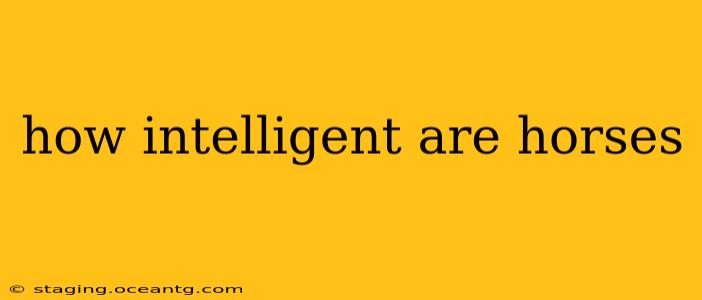Horses, majestic creatures often associated with strength and grace, possess a surprising level of intelligence that continues to fascinate scientists and horse enthusiasts alike. While they may not solve complex mathematical equations, their cognitive abilities are far more sophisticated than many realize, showcasing a blend of learned behaviors, problem-solving skills, and social complexity. This article delves into the fascinating world of equine intelligence, exploring their cognitive capabilities and answering common questions surrounding their mental prowess.
What are the signs of intelligence in horses?
One of the most compelling demonstrations of horse intelligence lies in their capacity for social learning. Horses live in complex social hierarchies, constantly interacting and communicating with their herd members. They learn from observing other horses, adopting behaviors and strategies that enhance their survival and social standing. This observational learning extends beyond simple imitation; they demonstrate an understanding of social cues and the consequences of their actions within the herd dynamic.
Furthermore, horses exhibit impressive problem-solving skills. Studies have shown their ability to navigate mazes, open latches to obtain rewards, and even recognize and respond to human cues, indicating a capacity for abstract thought and reasoning. Their remarkable memory, particularly for spatial locations and individuals, further supports their intellectual capacity.
Do horses have self-awareness?
The question of self-awareness in horses is a complex one, currently under investigation. While they may not exhibit self-recognition in mirrors (a common test for self-awareness in primates), their sophisticated social interactions and emotional responses suggest a level of self-understanding. They display empathy, recognizing distress in other horses and even humans, and react accordingly. This emotional intelligence suggests a level of awareness that goes beyond simple stimulus-response reactions.
How do horses communicate?
Equine communication is multifaceted, relying heavily on body language, which includes subtle shifts in posture, ear position, tail movements, and facial expressions. They use vocalizations, such as whinnies, snorts, and nickers, to convey different messages depending on the context. Horses also communicate through scent, marking their territory and recognizing individuals through olfactory cues. This intricate communication system allows them to maintain complex social structures and navigate their environment effectively.
Can horses understand human language?
While horses don't understand human language in the same way we do, they are remarkably adept at learning and responding to human cues. Years of domestication have fostered a strong bond between humans and horses, enabling them to interpret vocal commands, hand signals, and even subtle changes in human behavior. Their ability to learn and respond to specific commands, particularly in training scenarios, speaks volumes about their capacity for understanding and cooperation.
How smart are horses compared to other animals?
Comparing the intelligence of different species is challenging due to the diverse ways intelligence manifests. However, horses demonstrate cognitive abilities comparable to, and in some areas exceeding, those of other intelligent animals like dogs and pigs. Their exceptional memory, social complexity, problem-solving skills, and emotional intelligence place them firmly within the ranks of highly intelligent creatures.
Are horses capable of learning tricks?
Yes, absolutely! Horses are highly trainable animals and are capable of learning a wide variety of tricks, from simple commands like “walk” and “stop” to more complex maneuvers in dressage or trick riding. This showcases their ability to understand and respond to cues, remember sequences of actions, and adapt their behavior to achieve specific outcomes. This learning capacity reflects their intelligence and ability to form strong bonds with their trainers.
In conclusion, horses possess a remarkable level of intelligence that continues to surprise and inspire researchers. Their complex social structures, problem-solving abilities, and capacity for emotional understanding highlight their cognitive sophistication. Understanding equine intelligence not only enriches our appreciation of these magnificent animals but also offers valuable insights into animal cognition as a whole. Further research promises to unveil even more about the remarkable minds of these incredible creatures.
